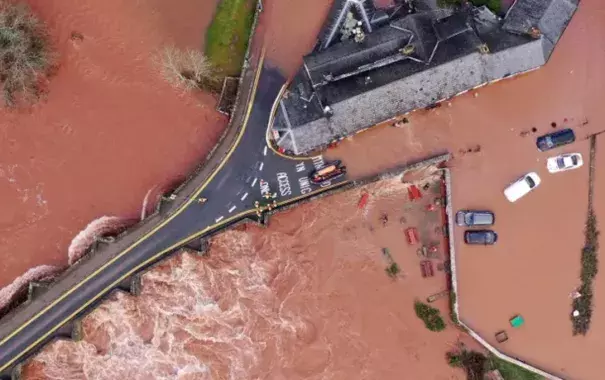Severe flood warnings remain as Johnson's response is criticised

Climate Signals Summary: Climate change is increasing the frequency and intensity of extreme rainfall events, and these events increase the risk of flooding. Bomb cyclones are rapidly developing low pressure systems that are primarily fueled by the contrast between warm and cold air masses. Climate change is linked to unusual jet stream behavior as well as many other factors that can affect storm activity and increase storm intensity, including with bomb cyclones, as was seen in the Central Plains in March of 2019.
Article Excerpt: Severe flood warnings remain in place and rescue operations were continuing in stricken communities on Monday evening, as the government faced criticism for its response to what has been described as unprecedented flooding in parts of the country.
...
The political row came as police confirmed a body had been found in the search for a woman whose car is believed to have got stuck in high water in the West Midlands. She has been named as Yvonne Booth, 55, from Great Barr in Birmingham. Another five people are thought to have died in the flooding this weekend.
Six “severe” flood warnings – meaning that there is a danger to life – were in place on Monday in Worcestershire, Herefordshire and Gloucestershire. Authorities said that the scale of flooding had been “unprecedented” in Wales.
...
The new environment secretary, George Eustice, on Monday defended the government’s record on responding to the storms, and to the wider issue of flooding. “The government has a firm grip on this,” he told Sky News. “It’s a very difficult situation, with widespread flood alerts, but our flood defences are working as intended.”
In the past year, he said, new flood-response infrastructure had protected more than 200,000 properties, with a further 100,000 due to be protected. The government had also pledged an extra £4bn in funding for flood defences over the next five years, said Eustice.
...
In south Wales, police declared a “major incident” on Sunday after more than a month’s rain fell in 48 hours, leading to multiple landslides and people being trapped in their homes. Pontypridd town centre was left underwater and surrounding towns and villages were told by the Met Office they could be cut off “perhaps for several days” because of the floods.
...
Sian Williams, the head of operations for north-west Wales at Natural Resources Wales, said: “This is unprecedented. The worst-hit area was from the Brecon Beacons into the south Wales valleys.
“We have had some of the highest levels we have ever seen in some rivers. The River Taff reached its highest level in over 40 years. This is unprecedented in terms of the scale of the rainfall and the levels of the rivers as well.”
...
More torrential rain of the sort which had swelled rivers to “exceptional” levels was meanwhile forecast to fall later this week, warned the Environment Agency (EA). It warned that the flood risk continues, with further heavy rain forecast in the north of England for Wednesday and Thursday, possibly falling on already flooded areas.


